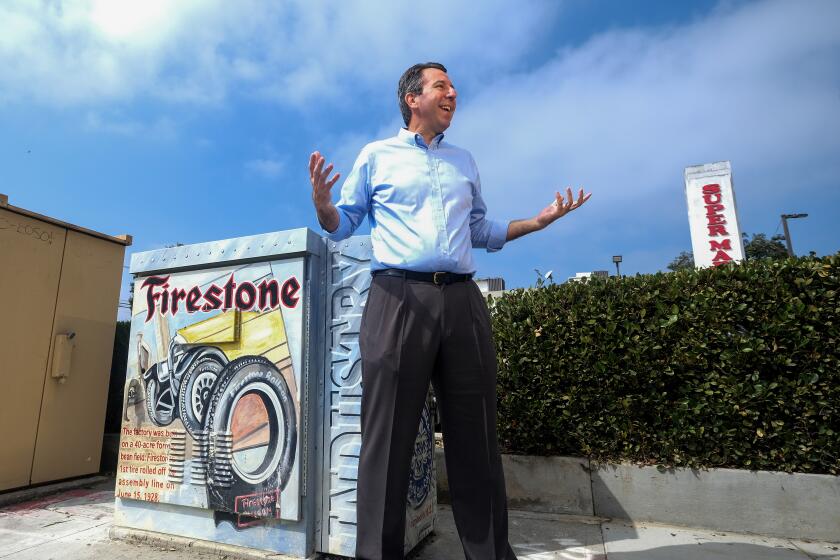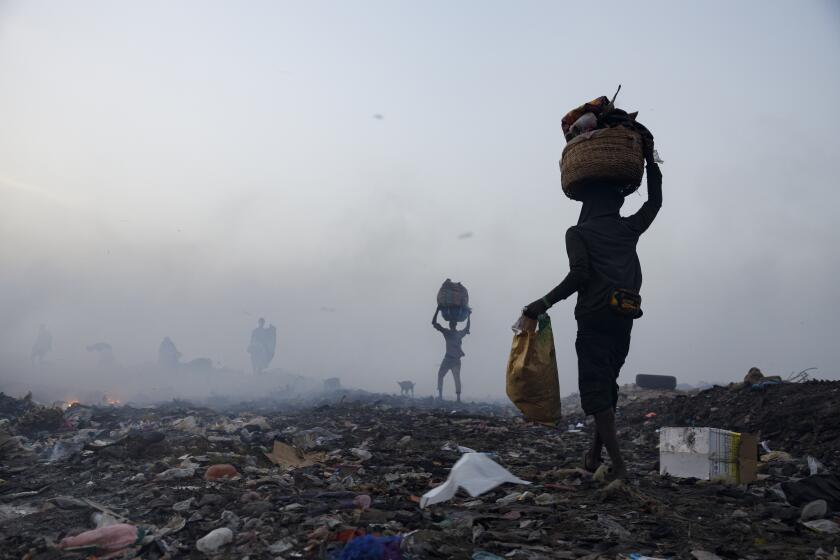California just set rules that trade short-term climate gain for long-term health and safety

- Share via
As long-serving members of the California Air Resources Board, we have prioritized environmental justice and community health, championing efforts to combat climate change. However, we believe state policies must thoughtfully address the consequences for communities least able to bear the associated costs.
This concern applies to CARB’s newly adopted amendments to accelerate the Low Carbon Fuel Standard, or LCFS, which we opposed. The fuel standard program, established in 2011, aims to reduce greenhouse gas emissions from transportation by capping the carbon intensity of fuels. The current program mandates a 20% reduction in fuel carbon intensity by 2030. The proposed amendments push this to a 30% cut by 2030 and 90% by 2045.
California has funneled billions of dollars toward curbing planet-warming gases from cows. Environmental experts say the state’s approach is flawed.
Faster implementation, however, risks increasing gasoline prices — a significant burden on low-income communities already struggling with costs. This issue has attracted attention from the media, legislators and the public. Beyond financial concerns, the LCFS has had another, less-publicized consequence: a dramatic transformation of California’s dairy industry.
Over the past decade, many dairies have shifted their priorities driven by LCFS incentives, with troubling public health consequences.
California’s dairy industry has historically focused on milk production, but today, many dairies are producing renewable natural gas by capturing methane from manure. The LCFS propels this trend through California’s carbon credit system, which aims to reduce greenhouse gas emissions. Under this program, entities earn and sell credits for cutting emissions, and dairies profit by converting methane into renewable natural gas. However, the system rewards larger-scale manure production, as more methane generates more credits and profits. This creates a perverse incentive, prioritizing pollution-heavy practices over sustainable, low-impact solutions.
Gas prices could rise after vote by California regulators
Capturing methane, a greenhouse gas over 80 times more potent than carbon dioxide in the short term, is vital for combating climate change. Yet, the methods to achieve reductions matter. The new amendments inadvertently incentivize the growth of mega-dairies now disproportionately concentrated in the Central Valley, where land is cheaper than other parts of the state — a region already grappling with environmental and health challenges.
As mega-dairies expand, their impacts on local communities worsen. According to comments from the Leadership Counsel for Justice and Accountability, a climate, health and equity organization working in the Central Valley, these facilities exacerbate air pollution, groundwater depletion and nitrate contamination, disproportionately affecting low-income Latino communities.
The promise of renewable natural gas as a “bridge fuel” is fundamentally flawed. Instead of transitioning toward sustainable decarbonization, the LCFS now encourages the expansion of large-scale dairies to maximize methane generation. Dairies are rewarded not for reducing methane emissions but for capturing what they generate, perpetuating pollution-heavy practices. More waste generated means more profit.
I’ve written about how CARB’s actions too often come off as pie-in-the-sky wokery that doesn’t seem to consider how working-class folks might be able to afford living in a purified paradise. That’s why I wanted to meet De La Torre, the second-longest-serving CARB member.
While capturing methane contributes to California’s greenhouse gas reduction goals, the collateral damage is undeniable. Mega-dairies are among the largest ammonia emitters, contributing to fine particulate matter pollution that causes respiratory illnesses and premature death. The Central Valley, already burdened with some of the worst air quality in the nation, cannot withstand additional harm. Moreover, nitrate runoff from manure continues to contaminate drinking water, disproportionately affecting disadvantaged communities reliant on domestic wells.
Accelerating LCFS mandates will only hasten the expansion of mega-dairies.
CARB has already undermined efforts to regulate livestock methane emissions. While we successfully pushed for regulations to begin by 2028, a last-minute change allowed mega-dairies to continue to profit from “avoided methane” credits based on flawed assumptions, encouraging herd consolidation and pollution-heavy liquid manure systems. Sustainable alternatives, such as dry handling or pasture-based systems, which generate far fewer pollutants, remain unsupported. For these reasons, we were on the losing side of a 12-2 vote by the board on the LCFS amendment.
Global methane emissions have risen faster than ever over the last 5 years, with at least two-thirds of annual methane emissions coming from human activities.
Methane is an immediate climate threat, and failure to address it would be catastrophic. However, ignoring the long-term environmental and social costs of factory-farm gas development prioritizes short-term climate gains over public health and equity. Our climate solutions must not come at the expense of environmental justice.
The LCFS program could be improved by capping the size and number of dairy operations eligible for methane incentives. Without such limits, we risk entrenching an industry whose environmental harms outweigh its climate benefits.
Additionally, CARB must prioritize sustainable methane reduction alternatives, including practices that reduce pollution at the source rather than perpetuating harmful systems. Setting these limits would create a fairer and more effective framework for addressing emissions while protecting vulnerable communities.
Fighting climate change is not just about dairies. It is about choosing a path that doesn’t result in more harm to vulnerable communities. For the sake of our air, water, and public health, we must ensure our solutions work for everyone, not just for those who profit from pollution.
Dean Florez, a member of the California Air Resources Board, is a former California Senate majority leader. Diane Takvorian, a member of the California Air Resources Board, is the co-founder and former executive director of the Environmental Health Coalition in San Diego/Tijuana.
More to Read
A cure for the common opinion
Get thought-provoking perspectives with our weekly newsletter.
You may occasionally receive promotional content from the Los Angeles Times.














